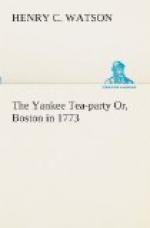INTRODUCTION.
Those who have been associated in the performance of any deed of valor or patriotism ever feel attracted to each other by an influence stronger and nobler than that of friendship. The daring patriots who joined in resistance to the tyrannizing might of Britain, were men pledged to die rather than betray each other, and to maintain their rights while they could lift the sword or aim the musket; and that pledge made them look upon each other in after years, when the storm of war was hushed and security dwelt at the fireside, as brothers whom no petty cause could sunder nor ill report make foes. These remarks apply, especially, to those who first threw themselves into the breach, and resolved that, if the British ministry would adopt such measures as the stamp act, their execution should be resisted and become difficult, and if such measures were passed as the act taxing tea, coffee, and the comforts of life, that the tea should never be landed, and thus prove a loss to its owners. The men who threw the tea into Boston harbor were patriots united by a sense that union was necessary for the salvation of liberty; and they were attracted to each other by the same influence during the bloody struggle which succeeded. What wonder, then, that they loved to meet in after years, to wish each other health and happiness, and chat over the stirring events in which they had participated, and to which their first bold deed was as the spark to dry hay, kindling to a fierce blaze the ready seeds of war.
It was the fourth of July in Boston. Throughout the city which cradled the Revolution, the anniversary of the birth of the free and happy United States of America was celebrated with rejoicings unknown to the shackled people of monarchical countries. Meetings were held in various parts of the city, patriotic and democratic speeches made, bells rung, cannons fired, pistols, crackers, and fireworks of all descriptions discharged, toasts drank, and festivities of all kinds indulged. The soldiers paraded the streets with fine bands discoursing most excellent music, and followed by the usual crowd. Bunker Hill was the scene of a large patriotic meeting, and the events of the ‘trying time’ were again and again recounted with much enthusiasm.
But a more unusual and far more interesting meeting occurred in Boston, about a quarter of a mile from the wharf known ever since the commencement of the Revolution as Griffin’s Wharf. In the upper room of an old and somewhat dilapidated tavern were assembled a party of old and young men—the representatives of two generations. Three of the old men were the remaining members of the famous Lebanon Club; the first liberty club formed in the colonies, and the one which designed and executed the project of destroying the tea at Boston. They had come from various parts of the country, upon agreement, to meet once more in the house where the disguised members of the club had met on the evening of the sixteenth of December, 1773. The names of the old patriots were David Kinnison, Adam Colson, and Lendall Pitts. Five other veterans had joined the party by invitation, together with half-a-dozen young men who had arranged the meeting and paid all expenses, with a view of passing the Fourth of July in a novel and interesting manner.




